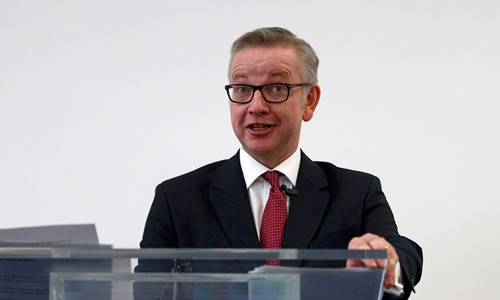The man who made Brexit leader lose his prime minister dream
Michael Gove, who has been branded a "traitor", admits he lacks charisma but insists he will be the one to bring change to Britain.
 |
British Justice Secretary Michael Gove. Photo: Reuters |
British Justice Minister Michael Gove shocked British politics on June 30 when he announced his candidacy for the position of Conservative Party leader and the next British prime minister, after David Cameron resigned.
Until June 30, Mr. Gove was known as a close ally of Boris Johnson, the former London mayor who led the campaign to leave the European Union (also known as Brexit) and had affirmed in many interviews that he was not interested in the position of prime minister. However, his unexpected candidacy has become a stumbling block that ruined the former London mayor's chances. Mr. Johnson, who was considered a strong candidate, announced a few hours later that he would not run for British prime minister.
According to Time, 48-year-old Minister Gove is known as one of British Prime Minister David Cameron's closest friends at Westminster. He often helps the Prime Minister prepare for the weekly House of Commons questions. However, his decision to join the Brexit campaign has been like a knife stabbing into this friendship.
Gove was born in Edinburgh and adopted at the age of four months by a couple in Aberdeen, Scotland. His father worked in the seafood industry and his mother was a laboratory assistant at the local university. Gove won a place at the area's most prestigious school, Robert Gordon's College, at the age of 11. Gove was good at sports and had rather old-fashioned hobbies, such as riding vintage bicycles and wearing suits. Gove even won a scholarship to the college when his family was in financial trouble.
Mr Gove's current reputation as "the most polite person in politics" was reflected in his youth. In an interview with the Guardian, the school's former headmaster, George Allan, said: "When I see Michael on television now, I can still see the same 11-year-old boy. He didn't change his personality throughout his school years. He was very consistent. We can't say we taught him manners. He created his own image."
From 1985 to 1988, Gove studied languages at Oxford University. His first job was as a journalist at Aberdeen Press and Journal. He then worked for the London Times, where he built a reputation as a neo-conservative foreign policy writer. According to the Guardian, Gove was a big fan of former US President George Bush, and called for US military action in Iraq two days after the 9/11 terrorist attacks. He also wrote about the threat of Islamic terrorism in his book.
In 2002, he co-founded the centre-right think tank Policy Exchange and befriended David Cameron – then a rising star in the Conservative Party. On Cameron's suggestion, Gove became an MP in 2005, and quickly became a darling of the right-wing media as he rose through the ranks of the Conservative Party.
Mr Gove was appointed education secretary in David Cameron's government in 2010. He caused controversy with his ambitious reform proposals for state schools, which included curriculum changes, rigorous testing, tougher rules for parents and the expansion of academies - schools funded directly by the state rather than by local councils. His efforts were heavily criticised by education experts and teachers, who went on strike in protest.
After the 2015 general election, Mr Gove became justice secretary. He won back public support by scrapping legislation requiring convicted defendants to pay trial costs, scrapping an unpopular prison training contract with Saudi Arabia, and changing rules limiting the number of books a prisoner could keep.
Admit your weaknesses
After the unexpected developments on June 30, some colleagues and the press called him a "traitor".However, Mr Gove said he was driven by conviction rather than ambition, and he had concluded that Mr Johnson was not the right person for the top job.Mr Gove said he listened to his heart and decided that standing for election was the right thing to do.
According to Reuters, Mr. Gove said he would not start the formal process of leaving the EU until next year and would not hold an early election.He also promised to cut immigration and end free movement for people from EU countries. European leaders have said Britain must maintain free movement rules if it wants access to the EU single market.
Mr Gove said he was the "candidate for change", citing his experience as education secretary and justice secretary. He promised that sThe money saved from leaving the EU would be spent mainly on healthcare.
"The country voted for change. And I can create it," he said.
Only five Conservative MPs showed up to hear his speech. The NYTimes commented that Mr Gove would need more support than that to be a real rival to Home Secretary Theresa May.
In his speech, he admitted his weaknesses.He admitted that he lacked popular appeal and said he "did almost everything to avoid running for prime minister".
“I was reluctant because I knew my weaknesses,” he said. “I had no charisma.”
According to VNE
| RELATED NEWS |
|---|

